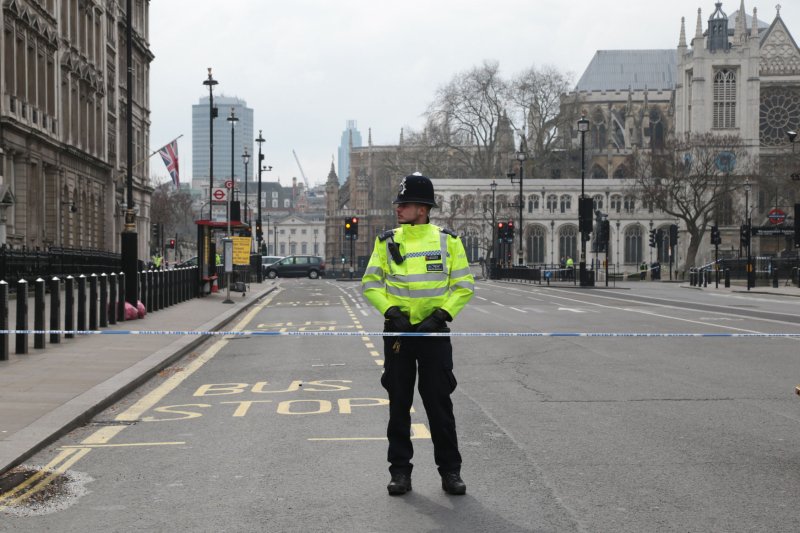Metropolitan Police remain vigilant and roads remain closed and cordoned off around Westminster after yesterday's terrorist attack on Westminster bridge and the Houses of Parliament where four victims died and 40 people were injured in London on Wednesday. The British home minister called for access to end-to-end encrypted messaging services after it was revealed the attacker used WhatsApp 2 minutes prior to the attack. Photo by Hugo Philpott/UPI |
License Photo
March 27 (UPI) -- British Home Secretary Amber Rudd said there should be "no place for terrorists to hide" as she suggested intelligence services have access to encrypted messaging services such as WhatsApp.
Rudd's call for access to encrypted services follows last week's attack in Westminster by Khalid Masood, who died after killed four people near the Houses of Parliament. At least 12 people have been arrested by officers investigating the attack.
Officials said Masood's phone connected to WhatsApp two minutes prior to launching the attack on Wednesday. Because WhatsApp has end-to-end encryption, law enforcement officials are unable to know what, if anything, he communicated using the app.
End-to-end encryption would also prevent the WhatsApp company itself from reading the message if intercepted.
"It is completely unacceptable, there should be no place for terrorists to hide," Rudd told BBC News. "We need to make sure that organizations like WhatsApp, and there are plenty of others like that, don't provide a secret place for terrorists to communicate with each other."
Rudd's proposal is not a new idea. After the San Bernardino, Calif., mass shooting in December 2015, the FBI and Apple confronted each other for months over access to the contents of Syed Farook's iPhone 5C after he and his wife killed 14 people during an office party. The FBI wanted Apple to disable the iPhone's features that reset the device and erased its contents after too many incorrect passcode entries. Apple refused on the grounds it would create security and privacy issues in the future.
Tech companies have said creating a "backdoor" into any device will make it vulnerable, meaning criminals could access the item.
"Compelling companies to put back doors into encrypted services would make millions of ordinary people less secure online," Jim Killock, executive director of Open Rights Group, a British non-profit, said. "We all rely on encryption to protect our ability to communicate, shop and bank safely."
London's Metropolitan Police said Masood acted alone but officers are working to determine his motive and if he was inspired by terrorist propaganda. The Islamic State took credit for the attack.
"It used to be that people would steam open envelopes or just listen in on phones when they wanted to find out what people were doing, legally, through warranty," Rudd said. "But on this situation we need to make sure that our intelligence services have the ability to get into situations like encrypted WhatsApp."
Europol Director Rob Wainwright also suggested a change was needed.
"I would agree something has to be done to make sure that we can apply a more consistent form of interception of communication in all parts of the way in which terrorists invade our lives," Wainwright said.
Jeremy Corbyn, the leader of Britain's Labour Party, said authorities already have "huge powers," adding that there needs to be a balance between the government's "right to know" and the population's "right to privacy."















